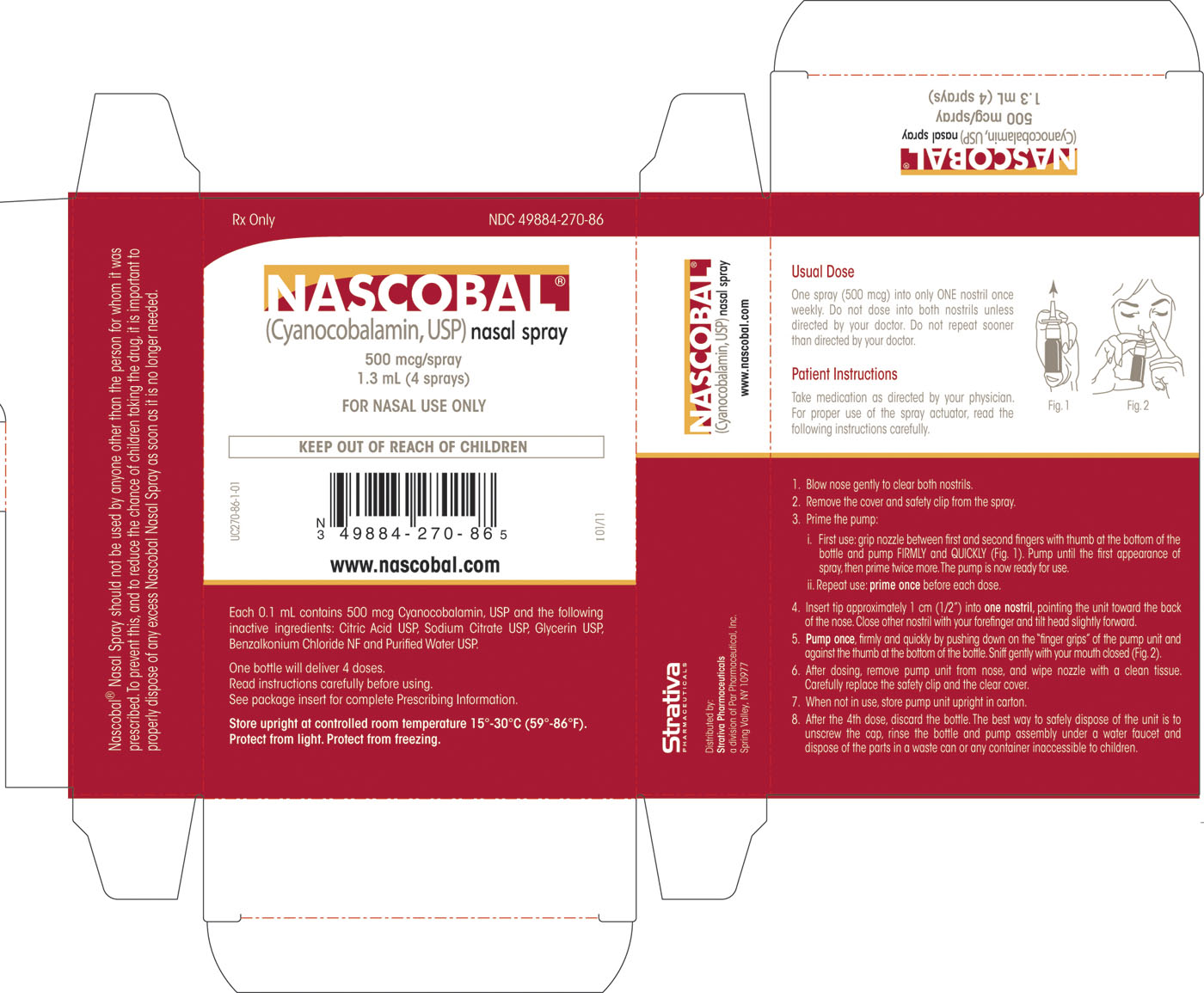Nascobal | Cyanocobalamin Spray while Breastfeeding

What is Nascobal | Cyanocobalamin Spray used for?
Nascobal | Cyanocobalamin Spray while breastfeeding safe or not? Can there be any side effects for infant while using it during breastfeeding?

7. NURSING MOTHERS Vitamin B12 appears in the milk of nursing mothers in concentrations which approximate the mother's vitamin B12 blood level. Amounts of vitamin B12 that are recommended by the Food and Nutrition Board, National Academy of Science-National Research Council for lactating women should be consumed during lactation.
Nascobal | Cyanocobalamin Spray Breastfeeding Analsys
Cyanocobalamin while Breastfeeding
SafeCAS Number: 68-19-9
Vitamin B12 exists naturally in milk at a concentration of 1 nanogram / mL (range: 0.3 to 3 ng / mL). Maternal supplementation with cyanocobalamin barely increases milk levels in well-nourished women (Sandberg 1981), but it does improve the levels in women of low socioeconomic status (Sneed 1981). The concentration in colostrum is up to 28 times higher than that of mature milk.The daily requirements for Vitamin B12 are 2.4 micrograms and increase to 2.8 micrograms daily during breastfeeding. Foods rich in vitamin B12 are meat, offal, eggs, dairy products, salmon, sardines, clams and fortified cereals. With a varied and balanced diet no vitamin supplements are needed, but B12 deficiency has been observed in the plasma and milk of women with strict vegetarian diets (vegans), malabsorptive diseases (eg, Crohn's disease, celiac disease), bariatric surgery, poor nutritional status, pernicious anemia, low socio-economic status and in cases of natural disasters or wars. There are numerous publications showing that infants of these mothers are at high risk of disease due to vitamin B12 deficiency, which can lead to anemia, stunting and psychomotor retardation. "Flash pasteurization" applied to breast milk of mothers who are HIV+ does not decrease vitamin B12 concentration. American Academy of Pediatrics: medication usually compatible with breastfeeding (AAP 2001).
Nascobal | Cyanocobalamin Spray Breastfeeding Analsys - 2
Cyanocobalamin while Breastfeeding
CAS Number: 68-19-9
Vitamin B12 is a normal component of human milk.[1] The recommended daily intake in lactating women is 2.8 mcg and for infants aged 6 months or less is 0.4 mcg.[2] Lactating mothers may need to supplement their diet to achieve the recommended daily intake or to correct a known deficiency. Low doses of vitamin B12 found in B complex or prenatal vitamins increase milk levels only slightly. Higher daily doses of 50 to 100 mcg or more are needed in cases of maternal deficiency. The breastfed infant is not exposed to excessive vitamin B12 in such cases, and their vitamin B12 status should improve if it was previously inadequate. Poor health outcomes in infants with vitamin B12 deficiency include anemia, abnormal skin and hair development, convulsions, failure to thrive, and mental developmental delay. One well-recognized at risk group are exclusively breastfed infants of mothers with B12 deficiency due to minimal or no dietary intake of animal products.[3][4][5][6][7][8][9] Infant vitamin B12 status can be improved through maternal B12 supplementation during pregnancy and lactation.[10][11][12][13] Deficient mothers who miss the opportunity to supplement during pregnancy should still be encouraged to supplement during early lactation since infant vitamin B12 status correlates with milk vitamin B12 levels in breastfed infants up to 6 months of age.[14][15][16][17] Although there are cases reported of exclusively breastfed infants with vitamin B12 deficiency having biochemical and clinical improvement through adequate maternal supplementation alone,[3] direct supplementation of the infant is recommended when such treatments are available.[18][19][8] Flash heat pasteurization of breastmilk does not reduce milk vitamin B12 concentration.[20]
I already used Nascobal | Cyanocobalamin Spray and meanwhile I breastfed my baby should I be concerned?
As usage of Nascobal | Cyanocobalamin Spray is mostly safe while breastfeeding hence there should not be any concern. In case of any change in behavior or health of your baby you should inform your health care provider about usage of Nascobal | Cyanocobalamin Spray else no further action is required.
I am nursing mother and my doctor has suggested me to use Nascobal | Cyanocobalamin Spray, is it safe?
Definitely, Nascobal | Cyanocobalamin Spray is safe in lactation for baby. No wonder your doctor has recommended it.
If I am using Nascobal | Cyanocobalamin Spray, will my baby need extra monitoring?
No extra baby monitoring required while mother is using Nascobal | Cyanocobalamin Spray
Who can I talk to if I have questions about usage of Nascobal | Cyanocobalamin Spray in breastfeeding?
US
National Womens Health and Breastfeeding Helpline: 800-994-9662 (TDD 888-220-5446) 9 a.m. and 6 p.m. ET, Monday through Friday
UK
National Breastfeeding Helpline: 0300-100-0212 9.30am to 9.30pm, daily
Association of Breastfeeding Mothers: 0300-330-5453
La Leche League: 0345-120-2918
The Breastfeeding Network supporter line in Bengali and Sylheti: 0300-456-2421
National Childbirth Trust (NCT): 0300-330-0700
Australia
National Breastfeeding Helpline: 1800-686-268 24 hours a day, 7 days a week
Canada
Telehealth Ontario for breastfeeding: 1-866-797-0000 24 hours a day, 7 days a week
